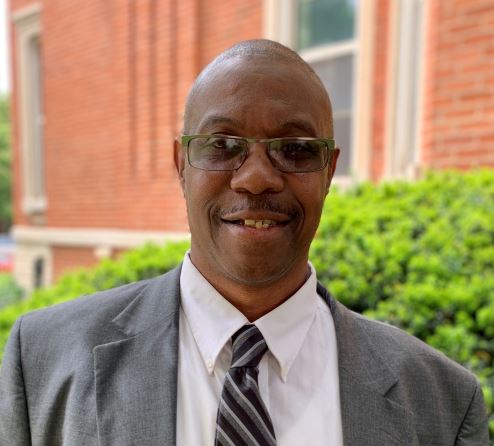Stories of Impact
David
Saint Leonard’s House Alum

“Early is on time and on time is late.” When you hear those words, you know Saint Leonard’s Ministries alumni and longest tenured employee, David Harris, is not far away! That mantra is the example of the discipline, dedication and work ethic David brings daily to Saint Leonard’s since his arrival to campus in 1996. David has always had a strong work ethic, even as a kid. The discipline that David acquired within himself took a while to emerge because he was exposed to much controversy and trauma as a child.
David is a life-long west side Chicagoan, knows the city like the back of his hand, loves to read and has an unwavering faith that guides his life. As David says, it is his “calling” to serve and help others. A path that was circuitous, painful and fraught with challenges along the way. As with everyone here at Saint Leonard’s, there is more to David’s story than meets the eye.
David was one of eight kids and lived with his mother and six of his siblings just a few blocks from the Saint Leonard’s campus. David recalls his mother’s home was a place to gather in the neighborhood, she would feed the kids, help the adults and was a good person to be around. He remembers either being under the table or in his mother’s lap when there was a neighborhood card game at her home. It was a warm, loving home and holds fond memories for David.
On December 11, 1965 David’s life changed in an instant. At the age of five, David lost his mother in a brutal arson fire at the Seeley Club on the west side. The following newspaper account details what took place.
“Shortly before the late-evening fire, a disagreement occurred between an employee and one of the customers, and the customer was asked to leave. The man left, walked to a nearby gasoline service station, and bought two gallons of gasoline. He returned to the tavern, opened the front door, and poured the gasoline into the entranceway. The gasoline flowed some 20 feet toward the center of the building. He borrowed a match from a passer-by and ignited the gasoline. The fire spread rapidly, involving combustible partitions, ceiling tile, furniture, and other contents; it was immediately so intense in the front section that the occupants could not escape by either the front door or the two front windows.”
David’s mother never had a chance. Once the match was pulled across the flint, 13 lives were lost and countless lives changed. All David had left was memoires of her warm embrace. David recalls looking at the newspaper describing the fire and ripping it up.
Seven kids, including David are now without their mother. David’s mother and her niece, David’s cousin, had made a pact that if something happened to the other one, the survivor would take care of the other’s children. David’s cousin had one daughter; a week after the fire she had seven more children to take care of while mourning the loss of her aunt.
At the tender age of six, David began to work various odd jobs. There was a blind preacher, James, in the neighborhood who would go downtown and David helped him sell things like pencils, gum and various sundries. They would return on the “L” and David would help him count the money. As a preacher, he would go to different churches on the South Side on Sundays and David would go with. David and the preacher would also go to the track and David learned to read the Scratch Sheets at an early age. David also found a paper route with grocery stores for their sales flyers. There was also a small convenience store in the neighborhood David would clean up in; David was hustling and had a work ethic! All the while living under less than desirable conditions while not being able to grieve the loss of his mother.
At the age of nine, living in a stressful, crowded house, David sister’s boyfriend got into a fight with his cousin’s husband. The end results of the fight was the sister’s boyfriend was stabbed to death. Though David didn’t witness the stabbing, he saw the body and recalls that was the first time he had witnessed that kind of violence. David knew he didn’t want to be around that.
David began to stay at different friends and siblings houses while still going to school. David’s brother was often in trouble and spent time in and out of juvenile facilities. By the time David was 12 he was homeless, moving from place to place, and began to smoke and drink. Still working hard and earning money, playing basketball, but David was on the streets; running with an older crowd and experiencing the things no 12-year-old should experience or learn.
David continued to live this life into high school. The one thing David still had and really enjoyed was basketball and David was good. However, David was using drugs in high school and it was effecting his play. David decided to drop out of high school in the 11th grade. David still had his work ethic, love of reading and faith. He may have even had an argument or two with his God and situation.
David eventually decided to enlist in the Navy with a friend but never made it into boot camp. He moved to Mississippi to live with his sister and worked in a shipyard for a few year before returning to Chicago with a woman friend. David lived with her for three years, they were using various drugs, freebasing cocaine mostly, while David was still working his many and diverse jobs.
From about 1987 through 1989 David was on “the trail” as he called it. Being on the streets also meant it was important to “affiliate” with a gang for both protection and to be left alone. Though David didn’t really participate in gang activity, affiliation was a matter of protection and survival. David described himself as a functional drug user during the week; David was still doing his sales paper job, which started at 4:00 in the morning. Weekends was for partying David shares…
Being on the trail David would stay at homeless shelters and be out at 4:00 to start his job. As David said, “Whatever your hustle was, you were out on the streets doing it until it was time to meet up at night at the shelter or soup kitchen.” At times, David was sleeping behind a grocery store by the expressway. The same grocery store he would deliver sales papers for during the day.
During this period, David recalls two impactful interactions while at friend’s houses. One from an older man who could see the struggle on David’s face and in his eyes. He told David, “If you learn to take the bitter with the sweet, things will work out for you.” Then there was the words of Miss. Hudson, “Why are you wasting all that talent!? You know you lie with garbage, you smell like garbage!” David remembers both encounters and those words stuck with him.
A year later David found himself in County Jail for dealing drugs with additional charges that did not apply to David. Those charges came because of David’s affiliation with a street gang despite not being active in the gang. David, with limited resources, found himself with a public defender. Justice is not just and freedom is not free. In this instance, David was encouraged to take the plea deal that offer him 7 years as opposed to 15 years. David didn’t know any better and, in retrospect, now knows how the system actually works for those with limited resources.
David’s street sense prepared him for Menard Correctional Center, his faith was being renewed and he was getting sober. As David sobered up his thinking cleared and he became stronger, explored Islam and took advantage of the limited resources offered during incarceration. David got an Associate’s Degree in computers and automotive, earned more advanced college credit and played a lot of chess. Of course David was reading! David was the Minister of Literature in prison, he handed out a lot of books, which meant he was off limits.
David was released in 1996 and came to Saint Leonard’s though he does not recall how he got here. When David arrived, it was a much stricter environment and after a couple of weeks, David told his sister he was ready to leave. David said his sister was always there for him and she had a $1,000 set aside for him. She encouraged David to stay. As David contemplated his next move sitting on a bench, he saw a woman he grew-up with who was struggling mightily. David could not believe it and began to cry; David decided to stay at Saint Leonard’s Ministries.
David worked and completed Saint Leonard’s programming. He got a job, met a woman who would eventually become is wife of seventeen years and he helped father two step-sons. Saint Leonard’s long-time executive director, Bob Dougherty, offered David a job as a night clerk and David has been with Saint Leonard’s in various roles with expanding and responsibilities ever since.
David is currently our Intake Housing Manager-his job is to talk with those men and women being released from Illinois prisons and jails and let them know what coming to Saint Leonard’s can mean for them as they return to our communities. David excels at the role and sets a tone of success for those arriving at Saint Leonard’s with apprehension about their next steps.
David sees men and women he has helped along the way and they frequently let David know how much he has helped them be successful. In typical David fashion, he tells them, “You did it! You did the work! This is your reward!”
Thankfully, David decided to stay the first couple of weeks into his time at Saint Leonard’s! As David told me, “This has to be God’s work, I was meant to be here. Including all the things I went through.” David is and has been an exemplary leader, mentor, guide and employee since his hiring. When asked how he survived “the trail,” Menard and life on the streets, David replies, “God moved me out of the way every time.”
David is truly a Face of Saint Leonard’s!!
